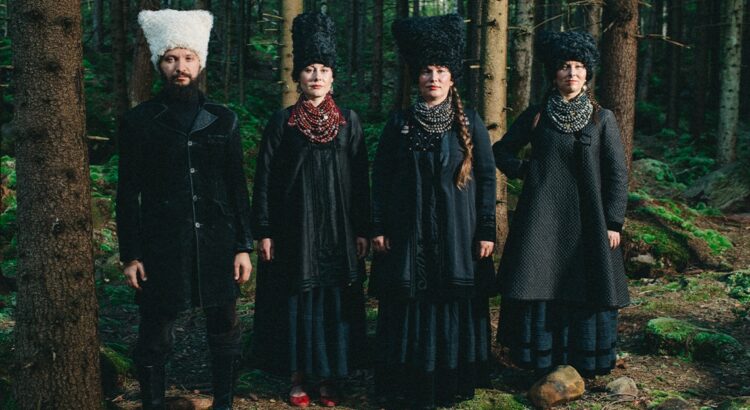7:30pm • Friday, Nov. 3, 2023 • Hill Auditorium
Seeing DakhaBrakha last Friday night at Hill Auditorium was a unique musical experience. DakhaBrakha is a Ukrainian folk-punk quartet composed of artists Marko Galanevych, Olena Tsybulska, Iryna Kovalenko, Nina Garenetska, that blends genres and sounds to create a musical signature which the band refers to as “ethno-chaos.” Their work derives from and pays tribute to Ukrainian folk music while existing in its own space of reinvention and joyful experimentation. Friday’s performance was dedicated to the bravery and resilience of the Ukrainian people, a message which the band conveyed through both their music and the visual representations which played behind them as they performed.
The performance followed a soft narrative arc, moving from a serious depiction of Ukraine in the midst of war to a hopeful glimpse at what a post-war Ukraine might look like. At first, the tone was almost solemn. The great destruction and loss faced by the Ukrainian people were juxtaposed with the resilience and vibrance of the culture and nation that empower them to continue fighting. Animations created by Ukrainian artists depicted stylized warriors swirling around the band as they performed, or eagles transforming into warplanes as they flew across the stage. For me, the most powerful imagery was during a song dedicated to those who are fighting for Ukraine’s freedom. The song featured a compilation of videos depicting dozens of Ukrainian soldiers in what seemed like small moments of lightness: smiling for the camera, laughing together, putting up peace signs and throwing their arms around one another. The last few songs looked forward into a future where Ukraine has peace and freedom. As the artists put it, after the winter comes spring, which they captured in a beautiful song that opened with startlingly realistic bird calls.
This was my first time listening to music with Ukrainian roots, which made the concert particularly exciting for me. The range of vocalizations employed by the artists was fascinating, and paired with their complicated, unfamiliar harmonies, I found myself completely absorbed in the aural experience of the performance. The song “Vynnaya Ya” exemplified this range: I loved how Galanevych’s voice bounced between growling bass and high, trumpet-like scatting.
In conclusion, I am so grateful that I had the opportunity to see this spectacular group perform in Ann Arbor, and admire DakhaBrakha’s commitment to uplifting Ukrainian voices and culture.


